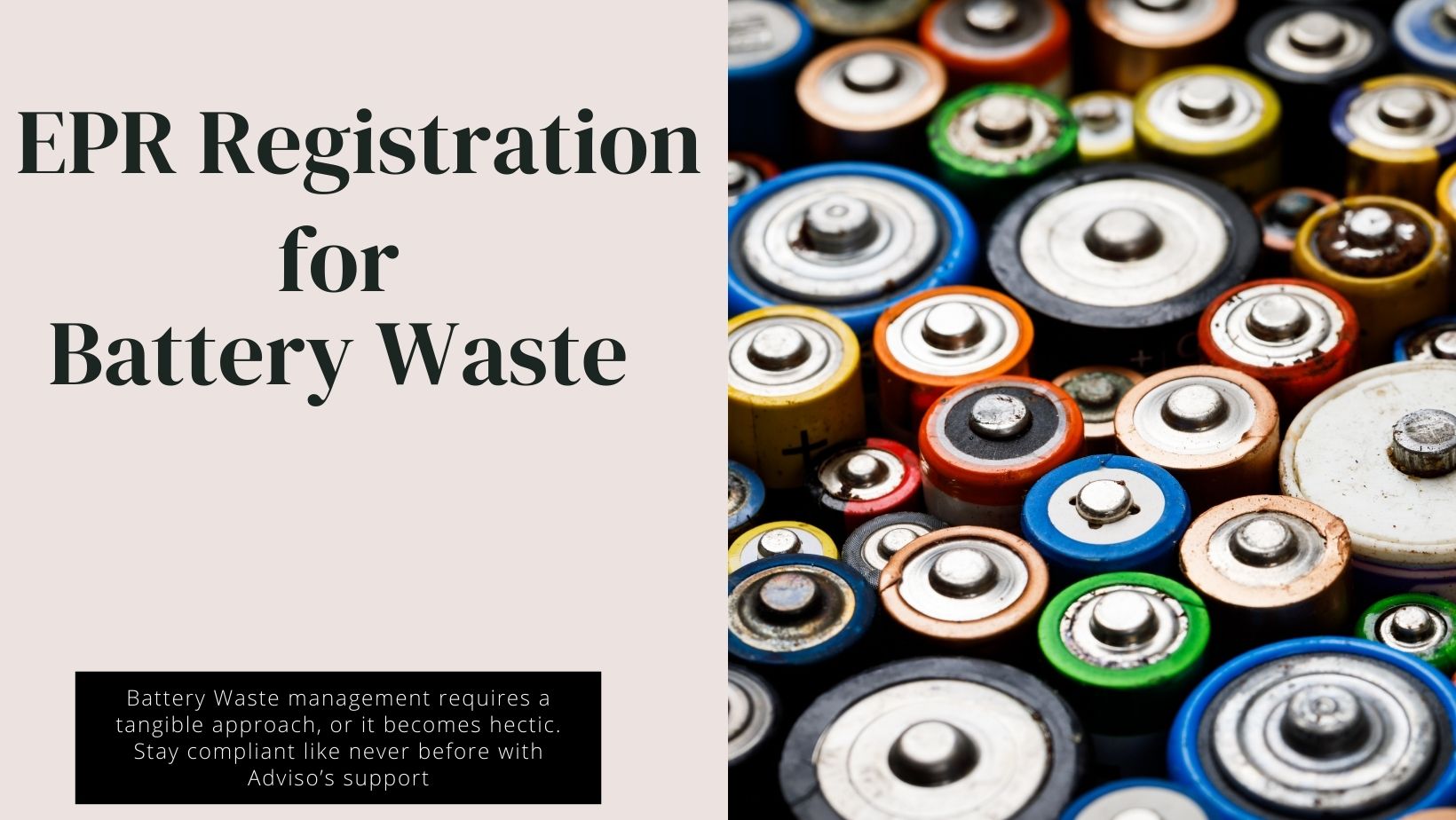Extended Producer Responsibility for Battery Waste
Extended Producer Responsibility for Battery Waste – With the rapid development of the Indian economy, the question of sustainability has become increasingly crucial. Businesses are now being asked to take responsibility for the waste they produce and ensure that it is safely disposed of. One of the core areas of growth is the manufacture of batteries to supplement the use of depleting and polluting fossil fuels.
While they might be the front runners in terms of environment-friendly alternatives to energy, they too have a limited period of use and are produced with materials that are hazardous to the environment. This means ensuring the safe disposal of these batteries is very crucial for the safety of the environment. That is the primary reason why several countries have enforced Extended Producer Responsibility (EPR) for batteries, which mandates battery producers to take responsibility for the safe disposal of their products once their utility ends.
What is Extended Producer Responsibility for Battery Waste?
Extended Producer Responsibility for Battery Waste or EPR is essentially an environmental policy wherein the manufacturers of environmentally hazardous products are given the responsibility of safely disposing of such products once they cease to be useable. This is an extension of the general responsibility of a producer towards their customer to a post-consumer stage, wherein they are supposed to ensure safe disposal of the hazardous products in an environment-friendly way.
In an EPR scheme, the manufacturers are under a mandatory obligation to take back their product once its useful life cycle ends and recycle or safely dispose of it instead of leaving this responsibility with the consumer or local authorities. It also means that producers have to develop systems or mechanisms to ensure that their products are collected and recycled and in certain cases even contribute to the costs for the recycling or safe disposal of their products.
What are the Benefits of Extended Producer Responsibility for Battery Waste?
While the Extended Producer Responsibility for Battery Waste in India is mandatory in India, it also brings with it a host of benefits such as –
- Improved Waste Management – EPR registration requires producers to come up with a plan for waste management, which in turn helps streamline the process of waste management. The accountability for establishing collecting and recycling or refurbishing battery waste helps in improving waste segregation, recycling efficiency, and an overall reduction in the amount of waste disposed of in the environment.
- Cost Efficiency – Establishing optimized systems of battery waste management can allow producers to reduce waste, boost operational efficiency, and also explore new revenue streams by recycling batteries, leading to an overall reduction in the costs of production and a boost in savings.
- Positive Brand Image – Implementing EPR registration can also help the producer boost his brand image and foster a sense of trust among eco-conscious consumers, helping improve brand loyalty and boost market competitiveness.
What does Battery Waste Mean?
The term battery waste included the following –
- Used and/or end-of-life battery that has completed its intended use along with its components and spare parts.
- Pre-consumer off-spec battery along with its ancillary parts.
- Batteries that have been discarded by the consumer.
- Batteries that have exceeded their term of appropriate use.
What are the EPR Rules for Battery Waste?
Currently, the producers of battery waste are regulated by the Battery Waste (Management) Rules, 2022 under the Environment (Protection) Act, 1986 which was implemented by the Ministry of Environment, Forestry and Climate Change after repealing the Battery (Management and Handling) Rules, 2001. The new rules were enacted in view of the growing concern for improperly managed battery waste and the environmental damage it causes to the ecosystem of the nation.
To Whom Do the EPR for battery waste Rules Apply?
The Extended Producer Responsibility for Battery Waste rules apply to the producers of battery waste. Producers include and mean any entity who is engaged in –
- Manufacture or sale of battery including refurbished battery, including in equipment, under its brand or,
- Sale of batteries including refurbished batteries, including in equipment, under its own brand produced by other manufacturers or suppliers or,
- Import of battery as well as any ancillary equipment which contains battery.
What are the EPR Obligations for Producers of Battery Waste?
The producers of batteries have the following EPR obligations according to the Battery Waste (Management) Rules, 2022 –
- The producers are imposed with an extended obligation for the battery that they sell in the market to be recycled or refurbished.
- They also have to meet the collection and recycling or refurbishing targets as specified in Schedule II of the Rules.
- The producers have to provide the annual Extended Responsibility plan vide Form 1C to the Central Pollution Control Board (CPCB) by 30th June of every year for the batteries manufactured in the previous financial year.
- The producers are also mandated to furnish the annual return vide Form-3 regarding the waste battery collected and recycled or refurbished to fulfill the EPR targets to the CPCB and the concerned State Pollution Control Boards of the respective states in which they operate by 30th June of the next financial year.
- They also have to provide the ratios of the registered recycler engaged by the producer and on behalf of whom the EPR certificates have been procured.
What is the Registration Process of Extended Producer Responsibility for Battery Waste?
The producers have to follow the following steps to successfully obtain the registration –
- The first step is to ensure that all the requisite documents are available and all the necessary compliances have been made. It’s always best to double-check for errors and discrepancies.
- Log into the online EPR portal and initiate the registration process.
- Fill the relevant information in the following sections in the E-form
- General Information
- Battery Type and Brand Name
- Sales Data and Daily Sales Estimates
- The Composition Material of the Battery
- Upload the Documents
- Confirm the Details and Make the Payment
- The Battery Constituents Wise Recycling targets will be auto-generated upon the submission of the application. The relevant recycling targets are calculated based on the Battery Collection Targets data and the Percentage of Battery Material in different battery types and compositions.
- Submit the application.
How is the Application Processed?
Once the application is submitted, it is processed by the CPCB as follows –
- The application shall be submitted within 15 working days, after which the registration shall either be approved or rejected.
- If the application is found to be incomplete during the processing, the applicant shall be informed about the same and be given time for rectification.
- If the authority finds any false or incorrect information, the application shall be rejected and the application fee shall be deemed to be forfeited.
- Portal-generated Registration certificate with a seal and sign of the Competent Authority shall be uploaded on the Portal.
- The Portal has a provision for the internal processing of applications within the CPCB, wherein the Member Secretary of the CPCB shall act as the Issuing Authority for the Certificate.
- Once the registration is granted, it shall be valid for a period of 5 years from the date of grant of Registration.
What are the Documents Required for Battery EPR Registration?
The following are the documents required for EPR registration of a battery producer in India –
- Taxpayer Identification Number (TIN)
- Corporate Identification Number (CIN)
- Aadhar Card of the authorized person
- Pan Card of Company involved in the Business
- Valid Consent Certificate from Water and Air Board
- Valid Consent Certificate from Hazardous Wastes Authorisation
- Proof of Ownership of the Business
- Factory/ Trade License and District Industries Certificate, if the unit is registered.
- Import Export Certificate in case of importers
- Self-attested copy of the GST Certificate of the Company
What is the Fee for EPR Registration for Battery Waste?
The Government fee for the EPR registration of battery waste producers is based on the annual turnover of the company and is as follows –
| Annual Turnover | Battery EPR Registration Fee |
| < 5 Cr | Rs. 10,000 |
| 5 Cr – 50 Cr | Rs. 20,000 |
| > 50 Cr | Rs. 40,000 |
However, the rates are subject to change based on the amount of waste being disposed.
Can the EPR Registration be Cancelled or Suspended?
Once the EPR registration is granted to battery producers, it is also liable to be canceled or suspended along with the imposition of an Environmental Compensation penalty in case of the following reasons –
- Failure to comply with the EPR obligations, targets, and guidelines based on which the registration was granted by the CPCB.
- If the documents submitted by the producer are found to be fraudulent, incorrect, or misrepresented.
However, in case of cancellation or suspension of the EPR registration, an opportunity will be given to hear the producer within 15 days from the issuance of notice of cancellation or suspension. Further, the aggrieved producer may also file an appeal with the Appellate Authority who shall be an officer of the level of Joint Secretary or the officer equivalent in the Ministry of Environment, Forest and Climate Change.
What is the Process of Renewal of EPR Registration of Battery Waste?
Once the EPR registration expires, the producers have to file an application to renew the same in the EPR portal 60 days prior to the date of expiry. The renewal fee is the same as the registration fee. However, the application will only be processed if all the annual reports have been duly filed by the producer. The registration shall be renewed for a term of up to five years within 15 days from the receipt of complete documents.
Why Adviso?
EPR registration is a mandatory process for battery producers in India and if the producer operates without the license, the CPCB may impose heavy penalties. However, EPR Registration involves several steps and compliances, which makes it a relatively cumbersome process and also increases the chances of errors.
Adviso comprises a dedicated team of experienced professionals who can help you get your EPR registration seamlessly on a minimal budget. Our team ensures that all your documentary and legal compliances are met efficiently so that you can focus on building your business. Connect with us to discuss your requirements and our team will be happy to help you resolve all your queries.
Summing Up
With growing concern for environmental safety, the issue of battery waste has become a serious issue across the globe. This has encouraged several nations to enact mandatory measures and EPR registration for safe disposal of battery waste. With batteries containing several chemicals that can be hazardous to the environment, the EPR Registration is a noble attempt to facilitate a safer and more efficient management of battery waste. Considering that the compliance process for EPR registration can be rather cumbersome, it is best to take the help of professional services like Adviso to ensure that all the compliances are met in time and within a minimal budget.
Read Our Article: How To Incorporate A Company In Colombia




